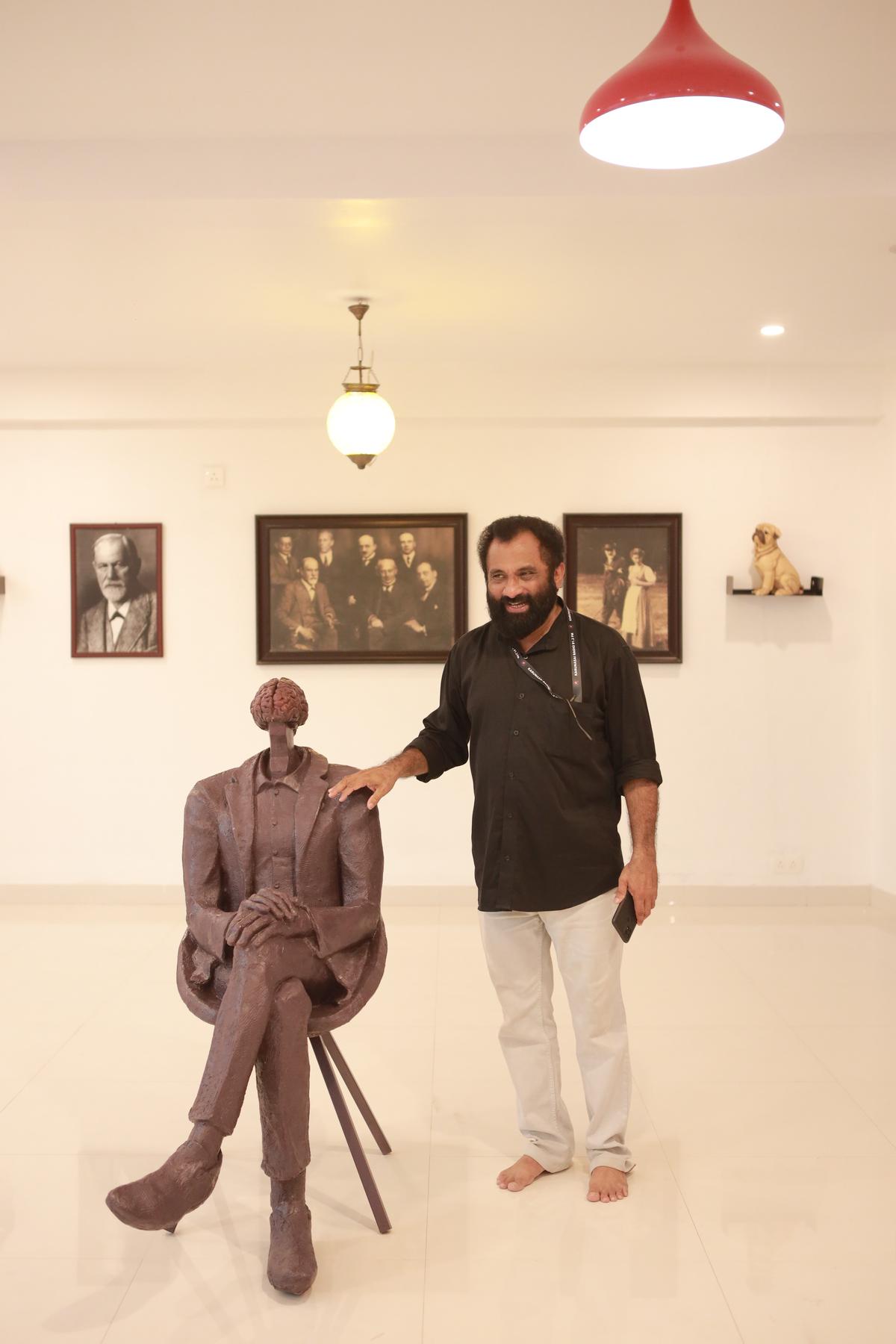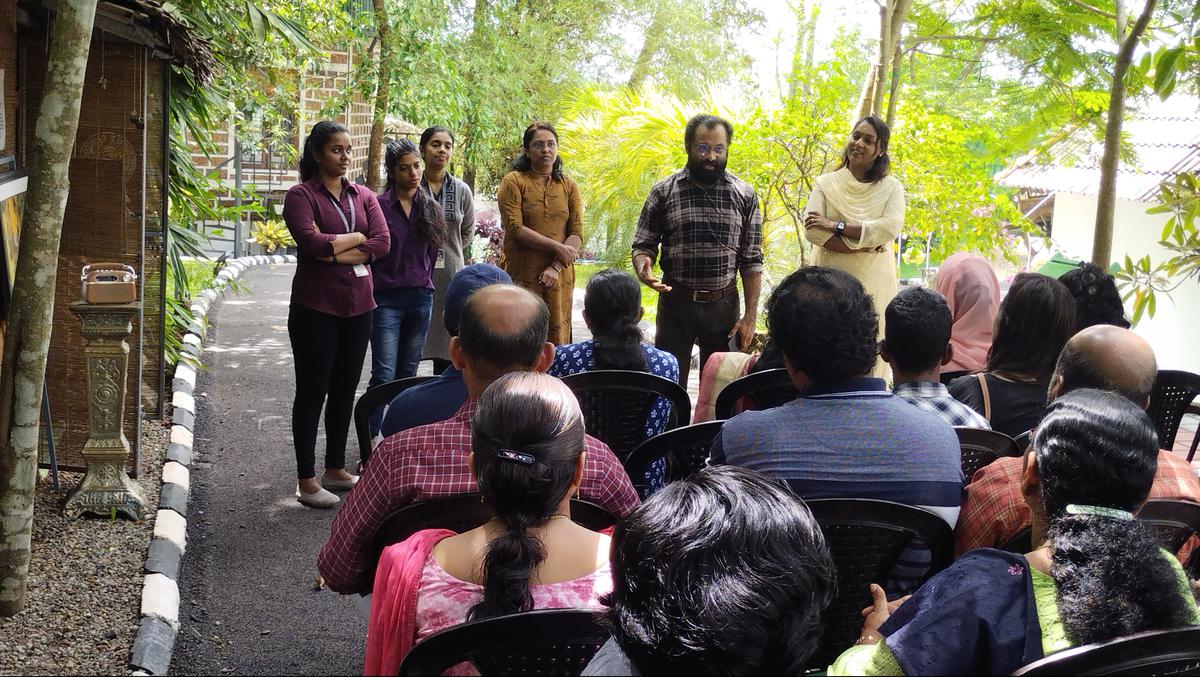[ad_1]
Mammootty’s Vidhyadharan, a character in his award-winning Bhoothakkannadi, develops hallucinations. In Mohanlal’s Thanmathra, a family is traumatised when the head of the family has an early onset of Alzheimer’s Disease. Kumbalangi Nights is a classic example of a broken family, with the characters going through depression, emotional breakdown and more. These are just three of the many Malayalam movies that explore of the vagaries of the mind. Psychological conditions and mental illnesses have a certain following in Malayalam cinema.
Realising the popularity of such films, Psychopark at Vellanad, has a section that is devoted to creating awareness of the different kinds of emotional, psychological and mental issues discussed in the movies from various languages with the help of film clippings. The theatre is one of the highlight of this sprawling ‘psychological theme park’, on two acres at Vellanad, 20 kilometres from Thiruvananthapuram.
Psychopark at Vellanad, Thiruvananthapuram
| Photo Credit:
Rajesh S
“This is the collective endeavour of a group of psychologists to break stigmas about psychology,” says LR Madhujan, psychologist, author and director of Psychopark.
A sculpture at Psychopark represents trephination, an ancient crude practice of drilling holes into the skull of a person with mental illness
| Photo Credit:
Rajesh S
Conceptualised as an edutainment centre, the place aims at providing information about the many aspects of the human mind and brain, psychology and its disciplines, human behaviour, myths and beliefs about mental illnesses and treatment, evolution of life and more. It is all done through games, stories, artefacts, demonstrations, models, paintings, statues, portraits and installations.
Although the Psychopark was officially declared open last month by the Governor of Kerala, Arif Mohammed Khan, people have been visiting the place for over a year now.
How it began
The parent organisation of Psychopark is Galaxy, a psycho-social collective registered by Madhujan and his group of psychologist friends in 1996. Four years later, they started Karunasai Deaddiction and Mental Health Research Institute at Vellanad. Madhujan says, “Karuna or empathy is the sublime word related to psychology. ‘Sai’ has nothing to do with the spiritual guru. It stands for See Always Inside, because empathy is a quality that has to come from within a person.”
Psychopark was a concept that developed organically. “When we conducted exhibitions across Kerala to create awareness about mental health, we found that people were always curious about psychology, probably because of topics such as hypnotism and mind-reading. So we considered having a permanent space where people could learn about the science behind psychology. The plan was to have a hall with exhibits. We called it Psychopark as psycho stands for mind and park corresponds to the green space where the building stands,” Madhujan explains. But, eventually, the project got bigger. It now stands on six floors, constructed at different levels from the ground owing to the topography of the terrain. “We got a grant from Ministry of Culture and the building was ready by 2018. It would have started functioning in early 2020 itself but for the pandemic,” he says.
Looking back
After an introductory session, a visitor enters ‘Yesteryards’, where we get to know how mental illnesses were handled in ancient times. An imposing sculpture depicts ‘trephination’, a crude practice of drilling holes into the skull of a person with mental illness, supposedly to let out the evil spirit. That was also meant to remove ‘Stone of madness’, a hypothetical stone that was believed to cause the illness! The sculpture itself is based on a painting by Dutch artist Hieronymus Bosch. Indian practices, especially methods of exorcism, have also been depicted.
Dopamine House — a building modelled after the first laboratory for psychology opened at the University of Leipzig, by Wilhelm Wundt, the father of modern psychology — is a sight to behold. Dopamine is an organic chemical that functions as a neurotransmitter. Inside this structure is a massive installation with 25,000 miniature figures, which represent the flow of dopamine in the body.
Other eye-catching works include a Tree of Unity — an installation in stainless steel that represents a family tree — and a huge cut-out of the sculpture ‘The Weight of Thought’ by Belgian artist Thomas Lerooy.
(From left) Resmi S Nair, CEO of Psychopark, LR Madhujan, director of the park, and Lekha C, project coordinator of the park
| Photo Credit:
Rajesh S
What is noteworthy is the way characters and incidents from folklore, epics, literature and history are linked with psychological behaviours and conditions. For example, a connection is drawn between the totem pole erected on the campus and Edassery’s famous work, Poothappattu, the emphasis of which is on good parenting.
Relief work is used to explain Cognitive Behavioural Therapy, a form of therapy that helps to change negative, unhealthy thoughts into positive ones. “We tell the story of sage Vibhandaka and his son, Rishyasringa, from the epics. We encourage visitors to participate in games and conversations to drive home the point,” Madhujan points out.

LR Madhujan at the Artificial Intelligence section of Psychopark, which will be opened soon
| Photo Credit:
Rajesh S
While books of different genres are kept on cute shelves across the campus, the centre also has a library, which has books related to psychology. A ‘brain museum’ with exhibits of the human brain and its parts awaits expansion. There is a socio-cultural museum with antiques where each exhibit is related to a psycho-neurological aspect. “For example, there is a section on old lamps, projectors and cameras. Even though animals and birds can see just like human beings, only we have the ability to visually process an image because we have a fully-developed occipital lobe in our brain,” he says. Visitors are also treated to an “experimental” audio drama, Manopournami.
One can ask any question under the sun at Psyversations, a Q&A session. “We have had school and college students, senior citizens, members of residents’ associations, psychologists and miscellaneous groups coming in,” Madhujan says.

LR Madhujan, director of Psychopark, Vellanad, interacting with visitors to the park
| Photo Credit:
SPECIAL ARRANGEMENT
Meanwhile, an Artificial Intelligence section is getting ready. A team of 10, comprising Madhujan, Resmi S Nair, CEO of the park, Lekha C, project coordinator, and a few psychologists, work behind the scenes.
Although the tour winds up by late evening, accommodation is provided for those who want to stay over and explore the park at length.
The park will be fully operational by August, but visitors are allowed now on prior appointment. It is closed on Mondays. Contact: 7012661001
[ad_2]
Source link


.jpg)